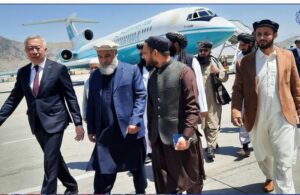KABUL (SW) – The coronavirus pandemic has set back Afghanistan’s economic growth by several years forcing the country to reallocate resources from long-term development priorities to fighting the health crisis, a latest report said on Wednesday.
This was stated by the UNDP as it launched its latest COVID-19 Socioeconomic Impact Assessment Note on Afghanistan titled “Fiscal Options in Response to Coronavirus Crisis”. The note is the fourth of a series of Country Notes that examine the likely effects of the coronavirus outbreak in Afghanistan with a focus on the fiscal implications of COVID-19.
Recent simulations from a single-country computable general equilibrium model (CGE) developed by UNDP estimates that due to a combination of external and internal shocks, the Afghan economy will contract by around 6 percent in 2020.
Assuming the recovery starts in 2021 and growth performance to be positive between 2021 and 2024, it will be moderate, and well below the pre-pandemic level. Without well thought-out recovery-oriented policies, this amounts to a cumulative loss of around 12.5 percent in real GDP by 2024, said the report.
Based on the findings of the Note, Afghanistan witnessed a sharp decline in revenues in 2020 due to low economic activity, trade disruption and weaker compliance brought on by the pandemic. The government had to adjust the revenue estimates downwards from Afs 209 billion (USD 2.71 billion) in 2019 to Afs 144 billion (USD 1.87 billion) during the mid-year budget review.
UNDP CGE model simulations estimated an average of 17 percent decline in corporate tax revenue and 18 percent decline in personal income tax revenue. Tax on international trade will be the worst hit and revenues may decline to as low as 19 percent due to the decrease in imports, while tax revenue on goods and services might decline by 10 percent. The fiscal deficit is expected to increase to around 4 percent of GDP in 2020.
The Afghan government needs to opt for policies and programs to generate more revenue to address the fiscal deficit, said the report.
Given the economic slowdown, a second wave of the pandemic, continued conflict, and an uncertain peace process and political environment, the country will continue to need grant support from the international community to address the fiscal deficit and maintain its current level of expenditure on basic services, the UNDP predicted.
It said additional grants need to be directed at driving and implementing reforms to improve the business regulatory environment, improve governance, encourage investment and strengthen the private sector.
UNDP’s socio-economic recovery offer to fight against COVID-19 aims to enable national and sub-national authorities to address the immediate fiscal impact of the pandemic in the short-run and help reverse its negative effects on the country’s development agendas and attainment A-SDGs in the medium and long-run.
The UNDP, along with other development partners, is supporting the government of Afghanistan in the run up to, and after, the pledging conference by presenting donors and friends of Afghanistan with evidence-based research and a clear picture of the situation to ensure the international community continues to support Afghanistan to address its fiscal needs and its recovery path from the COVID-19, that is informed by data and research.
ENDS






